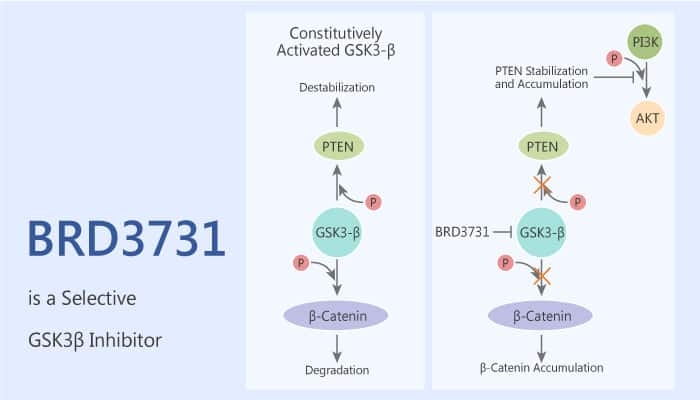Glycogen synthase kinase 3 (GSK3) is a key regulatory kinase in the WNT pathway. GSK3 remains a therapeutic target of interest in many diseases. GSK3 represents an example of such an evolutionary selection system, resulting in two paralog genes, GSK3A on chromosome 19 and GSK3B on chromosome 3. The encoded paralog proteins, GSK3α and GSK3β, have a high degree of similarity. GSK3α and GSK3β paralogs also have distinct, albeit uncharacterized, functions. However, both GSK3 paralogs have relations in the pathophysiology of a number of human disorders. They include non-insulin-dependent diabetes mellitus, cardiac hypertrophy, neurological and neurodevelopmental disorders, and cancer. While dual GSK3α/β inhibitors have entered clinical trials, none has successfully translated to clinical application. In this study, BRD3731 is a selective GSK3β inhibitor, with IC50s of 15 nM and 215 nM for GSK3β and GSK3α, respectively. It displays 14-fold selectivity for GSK3β.

BRD3731 displays reduced potency towards the GSK3β (D133E), with an IC50 = 53 nM compared to GSK3β (wt) (cf. IC50 = 15 nM). Moreover, BRD3731 inhibits GSK3β with a Kd of 3.3 μM in cellular context. In addition, BRD3731 is a GSK3β- selective inhibitor from patent US20160375006A1, compound example 272. It (1-10 μM) inhibits the phosphorylation of CRMP2 in SH-SY5Y cells. Moreover, BRD3731 (20 μM) decreases β-catenin S33/37/T41 phosphorylation and induces β-catenin S675 phosphorylation in HL-60 cells. BRD3731 (10-20 μM) impairs colony formation in TF-1 and increases colony-forming ability in the MV4–11 cell line. Furthermore, it (30 mg/kg; i.p.) reduces audiogenic seizures in Fmr1 KO mice.
In summary, BRD3731 is a selective GSK3β inhibitor. It has the potential for the research of mood disorder, post-traumatic stress disorder (PTSD), psychiatric disorder, diabetes, and neurodegenerative disorder.
Reference:
Edward Scolnick, et al. US20160375006A1.; Wagner FF, et, al. Sci Transl Med. 2018 Mar 7;10(431):eaam8460.